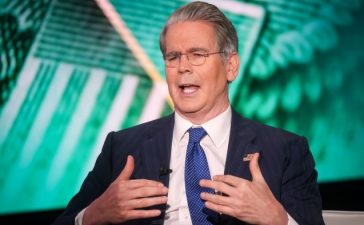Former U.S. President Donald Trump walks outside the courtroom on the day of a court hearing on charges of falsifying business records to cover up a hush money payment to a porn star before the 2016 election, in New York State Supreme Court in the Manhattan borough of New York City, U.S., February 15, 2024.
Andrew Kelly | Reuters
A New York judge Friday ordered Donald Trump to pay more than $350 million in total penalties as part of his ruling in the former president’s civil business fraud trial.
Manhattan Supreme Court Judge Arthur Engoron also barred Trump from serving as an officer or director of any New York corporation or other legal entity in the state for three years.
And Trump is banned for three years from applying for loans from any financial institution chartered by or registered with the New York financial services department.
“New York means business in combating business fraud,” Engoron wrote in the 92-page ruling.
The judge delivered the final decision from the trial, which was held without a jury.
“President Trump will of course appeal and remains confident the Appellate Division will ultimately correct the innumerable and catastrophic errors made by a trial court untethered to the law or to reality,” Trump’s attorney Chris Kise said in a statement following the ruling.
The appeals process could take several years to resolve.
The explosive trial stemmed from New York Attorney General Letitia James’ lawsuit accusing Trump, his two adult sons, his company and top executives of fraudulently inflating Trump’s assets to boost his stated net worth and obtain various financial perks.
James had asked Engoron to ban Trump for life from New York’s real estate industry, and for $370 million in disgorgement, a term for returning ill-gotten gains.
Instead, Engoron fined Trump a total of $354,868,768.
The judge also ordered Eric Trump and Donald Trump Jr., who took over the Trump Organization after their father became president in 2017, to pay fines of more than $4 million each.
Eric and Trump Jr. also face two-year bans from serving as officers or directors of any New York corporation or legal entity.
Co-defendants Allen Weisselberg, the Trump Organization’s former chief financial officer, and the company’s comptroller, Jeffrey McConney, are permanently banned from controlling the finances of a New York business, Engoron ruled.
Friday’s decision is only the latest court-ordered punishment imposed on Trump, who is running for president while dealing with numerous criminal and civil lawsuits. Last month, a jury in a separate civil case in New York federal court ordered Trump to pay $83.3 million for defaming writer E. Jean Carroll when he responded to her claim that he had raped her in the mid-1990s.
Trump is the clear front-runner for the Republican presidential nomination, setting up a likely rematch with President Joe Biden, who beat him in 2020.
Trump has frequently raged against his many legal battles as “witch hunts,” claiming they are part of a Biden administration-backed conspiracy to tank his political ambitions.
He vociferously denies all wrongdoing in the New York fraud case, blaring his claims of total innocence on social media, at the courthouse and even on the witness stand.
Trump claimed to be worth far more than what was reported on his financial statements, while asserting that a disclaimer on the records protected him from liability for any inaccuracies.
But Trump and the other defendants were found liable for fraud by Engoron before the trial even began.
In a bombshell pretrial ruling, Engoron granted summary judgment on James’ main cause of action â that the defendants committed fraud in violation of New York law.
Engoron found that Trump’s statements of financial condition between 2014 and 2021 overvalued his assets between $812 million and $2.2 billion.
The ruling razed Trump’s defense claims, accusing him and his co-defendants of trying to convince the court to “not believe its own eyes.”
Engoron also ordered the cancellation of the defendants’ business certificates and the appointment of an independent receiver to manage the dissolution of Trump’s corporate entities. Some experts have described the ruling as a “death penalty” for the Trump Organization.
But that order was put on hold during the trial, which was conducted to determine the amount to be paid in penalties and resolve other claims of wrongdoing from James’ lawsuit.
The trial also doubled as a soapbox for Trump to air his grievances about his perceived political foes, including those sitting feet away from him in court.
On the witness stand, Trump railed against Engoron and James while defending the values that were reported on his statements of financial condition. Trump also tore into another key witness, his former fixer and personal lawyer Michael Cohen, who testified that Trump had directed him to falsely manipulate his net worth.
Trump’s venting brought consequences. On the second day of the trial, Engoron imposed a narrow gag order after Trump repeatedly targeted the judge’s principal law clerk, Allison Greenfield, who sat in court.
Trump violated the gag order twice within four weeks, catching fines totaling $15,000.
This is breaking news. Please check back for updates.
Don’t miss these stories from CNBC PRO:









